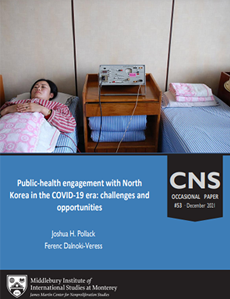December 9, 2021
Joshua H. Pollack and Ferenc Dalnoki-Veress
 The effective closure of North Korea’s borders to travel and commerce since the early 2020s in response to the COVID-19 pandemic makes it almost impossible for North Koreans to interact and exchange perspectives with the outside world. This situation is contrary to the interests of North Koreans and the international community alike. A new program of humanitarian aid will be needed to permit a safe reopening, and potentially also to address the human consequences of the protracted closure.
The effective closure of North Korea’s borders to travel and commerce since the early 2020s in response to the COVID-19 pandemic makes it almost impossible for North Koreans to interact and exchange perspectives with the outside world. This situation is contrary to the interests of North Koreans and the international community alike. A new program of humanitarian aid will be needed to permit a safe reopening, and potentially also to address the human consequences of the protracted closure.
Aid should not be made conditional upon other policy goals, such as nuclear and missile nonproliferation. Implicit linkages between these issues during the 1990s and 2000s increased Pyongyang’s suspicions about the purposes of aid without providing sufficient leverage to compel disarmament.
Reopening the country will require a judgment by the North Korean leadership that it is safe to do so. First, Pyongyang must be confident that a vaccination campaign against COVID-19 would do more to prevent the spread of illness than to enable it. Toward this end, aid organizations should be prepared to demonstrate to North Korean officials how seriously they take the COVID-19 threat.
The present closure is the third time since 2002 that North Korea has closed its borders in response to an epidemic threat. This approach reflects awareness of the vulnerability of the public in the aftermath of the crisis of the 1990s and the weakness of the country’s health system, which has facilities and trained personnel, but is persistently lacking in medicines and equipment. The replenishment of these goods will be needed to avoid future closures.
To facilitate these efforts, policymakers should find ways to streamline the humanitarian exemptions processes included in sanctions regimes and create a stable banking mechanism to support the activities of aid organizations working inside the country.
